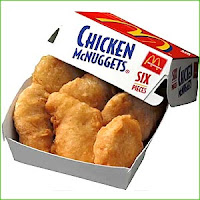The media doesn't often challenge conventional wisdom on certain issues, especially when it comes to food, so when it does happen it's all the more noteworthy. Such is the case with in the Montreal Gazette on McDonald's McNuggets. The story takes a look at what McNuggets are really made of, and I must give the writer - Joe Schwarcz, director of McGill University's office for science and society - kudos for taking down some myths that continue to be perpetuated.
One of the big assumptions laid low in the article is one put forward by Michael Pollan, author of The Omnivore's Dilemma, about how McNuggets are actually 56 per cent corn. He came to his calculation by asserting that because the chickens from which nuggets are made are fed primarily corn, they of course must be corn. But, as the story states, that's a preposterous idea because we really aren't what we eat: "Using this logic, we could all be described as being made of plants, since every bit of our flesh can be traced back to some plant product."
Another issue Schwarcz tackles is the suggestion by Joseph Mercola, a doctor who's pretty popular on the web, that McNuggets contain a chemical called dimethyl polysiloxane, which is also a major ingredient in Silly Putty. The implication by association is, of course, that you wouldn't want to eat Silly Putty.
But, as Schwarcz points out, dimethyl polysiloxane is an approved additive for frying oils. All chemicals become toxic at a certain level and with this particular one, you'd need to eat about 10,000 chicken McNuggets in one sitting to encounter problems. Besides that, the base argument is wrong:"Do we eschew salt because it is used to de-ice streets, or water because it is an essential ingredient of cement?"
It's a great article that you should check out. Schwarcz also has some good points on whether we should eat anything containing chemicals we can't pronounce.
And oh yes, if you're wondering: chicken nuggets are actually made from chicken. And no, they're generally not good for you, mostly because they contain a lot of fat and salt.

2 comments:
Can you link up the other article about food containing chemicals we can't pronounce?
It's all in that same article.
Post a Comment